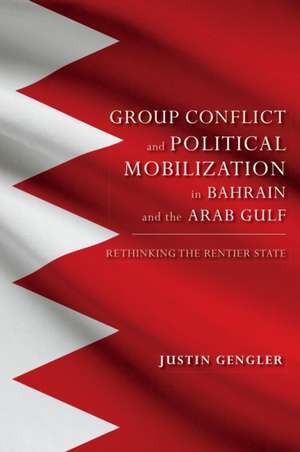Group Conflict and Political Mobilization in Bahrain and the Arab Gulf: Rethinking the Rentier State: Indiana Series in Middle East Studies (Paperback)
Autor Justin Gengleren Limba Engleză Paperback – 7 iun 2015
The oil-producing states of the Arab Gulf are said to sink or swim on their capacity for political appeasement through economic redistribution. Yet, during the popular uprisings of the Arab Spring, in Bahrain and all across the Arab Gulf, ordinary citizens showed an unexpected enthusiasm for political protest directed against governments widely assumed to have co-opted their support with oil revenues. Justin Gengler draws on the first-ever mass political survey in Bahrain to demonstrate that neither is the state willing to offer all citizens the same bargain, nor are all citizens willing to accept it. Instead, shared social and religious identities offer a viable basis for mass political coordination. Challenging the prevailing rentier interpretation of political life in the Gulf states, Gengler offers new empirical evidence and a new conceptual framework for understanding the attitudes of ordinary citizens.
Preț: 236.78 lei
Nou
45.31€ • 47.43$ • 37.49£
Carte tipărită la comandă
Livrare economică 05-19 aprilie
Specificații
ISBN-10: 0253016800
Pagini: 226
Dimensiuni: 150 x 226 x 15 mm
Greutate: 0.36 kg
Ediția:
Editura: Indiana University Press
Seria Indiana Series in Middle East Studies (Paperback)
Notă biografică
Justin Gengler is Senior Researcher at the Social and Economic Survey Research Institute (SESRI) at Qatar University.
Cuprins
Introduction: Mountain of Smoke: Bahrain, the First Post-Oil State
1. Group-based Political Mobilization in Bahrain and the Arab Gulf
2. Al-Fatih wa al-Maftuh: The Case of Sunni-Shi'i Relations in Bahrain
3. Religion and Politics in Bahrain
4. Surveying Bahrain
5. Rentier Theory and Rentier Reality
6. Political Diversification in the Age of Regime Insecurity
Appendix
Notes
Bibliography
Index












